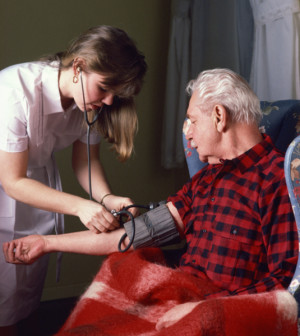- 8 Ways to Increase Dopamine Naturally
- 7 Best Breads for Maintaining Stable Blood Sugar
- Gelatin vs. Collagen: Which is Best for Skin, Nails, and Joints?
- The Long-Term Effects of Daily Turmeric Supplements on Liver Health
- Could Your Grocery Store Meat Be Causing Recurring UTIs?
- Are You Making This Expensive Thermostat Error This Winter?
- Recognizing the Signs of Hypothyroidism
- 10 Strategies to Overcome Insomnia
- Could Artificial Sweeteners Be Aging the Brain Faster?
- Techniques for Soothing Your Nervous System
Alzheimer’s ‘Epidemic’ Straining Caregiver, Community Resources: Report


THURSDAY, Sept. 19The so-called global Alzheimer’s epidemic is leading to a shortage of caregivers for seniors and a lack of support for family members who look after elderly relatives, according to a new report.
Released Thursday, the report said the number of dependent older adults will increase to 277 million by 2050, and half of seniors who require personal care have dementia.
As the world’s population ages, the traditional system of informal care provided by family, friends and the community will require much greater support from governments. This means leaders worldwide need to make dementia a priority by implementing national plans and having discussions about future strategies for long-term care, according to the World Alzheimer’s 2013 report.
Worldwide, 13 percent of people 60 and older require long-term care, the report said. Between 2010 and 2050, the number of older adults with care needs will nearly triple, from 101 million to 277 million.
Long-term care is mainly about care for people with dementia, according to the report. About half of all older people who need personal care have dementia, and 80 percent of seniors in nursing homes have dementia. The worldwide cost of dementia is currently more than $600 billion.
More attention needs to be paid to helping dementia patients and their families “live well with dementia,” the report said. It also called for a 10-fold increase in research funding to “re-energize” the work on dementia prevention, treatment and care.
Among specific recommendations are the following:
- Having systems in place to monitor the quality of dementia care in all settings, whether in the community or care homes
- Promoting autonomy and choice for patients at all stages of dementia and for their caregivers
- Better integration and coordination between health and social care systems to meet patients’ and caregivers’ needs.
- Adequately training frontline caregivers, with systems in place to ensure that paid and unpaid caregivers receive appropriate financial rewards — both to sustain the informal care system and improve recruitment and retention of paid caregivers
- Properly valuing unpaid work of family caregivers. Although care in care homes is a preferred option for a significant minority, quality of life at home can be just as good and costs are comparable.
- Monitoring quality of care in care homes through the quality of life and satisfaction of their residents, in addition to routine inspections.
“People with dementia have special needs. Compared with other long-term-care users they need more personal care, more hours of care and more supervision, all of which is associated with greater strain on caregivers, and higher costs,” report author Martin Prince, a professor at the Institute of Psychiatry at King’s College London, said in a college news release. “Their needs for care start early in the disease course, and evolve constantly over time, requiring advanced planning, monitoring and coordination.”
“We need to value the unpaid contribution of family caregivers more, and reward paid caregivers better,” Prince said. “We can build quality into our care systems, but to do so while containing costs and achieving equity of access for all will be a challenge.”
More information
The U.S. National Institute on Aging has more about Alzheimer’s disease.
Source: HealthDay
Copyright © 2026 HealthDay. All rights reserved.










